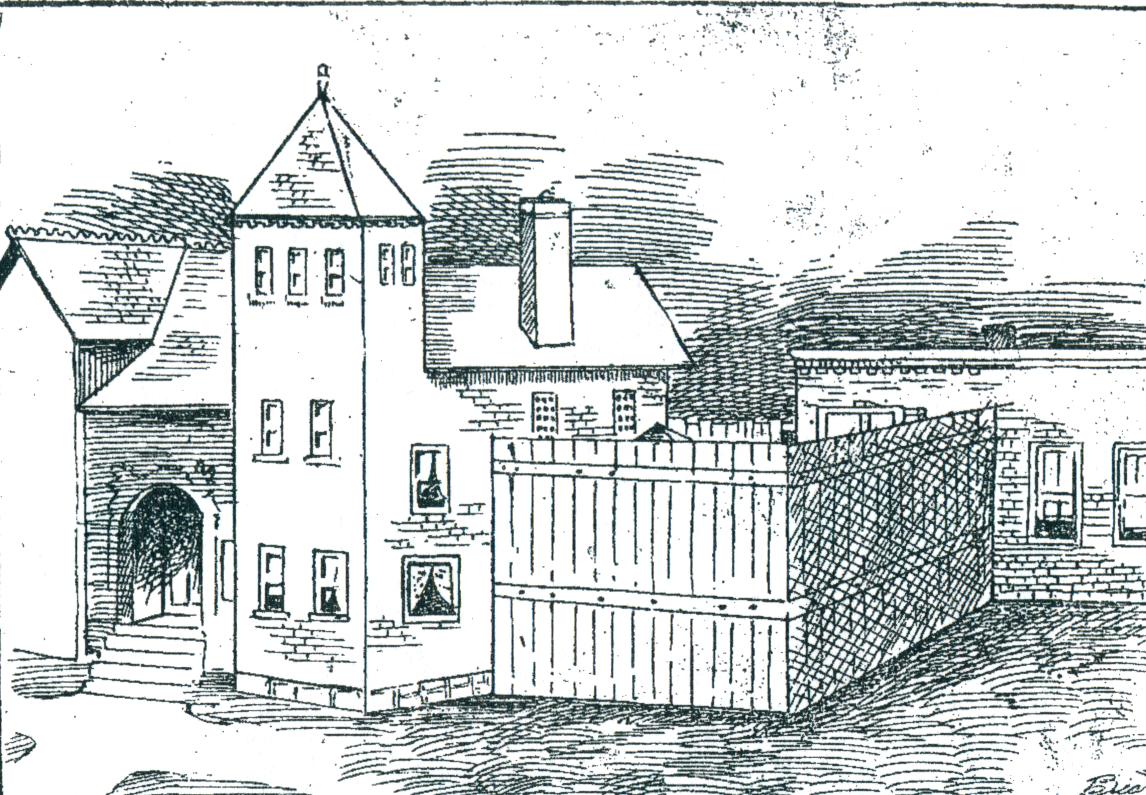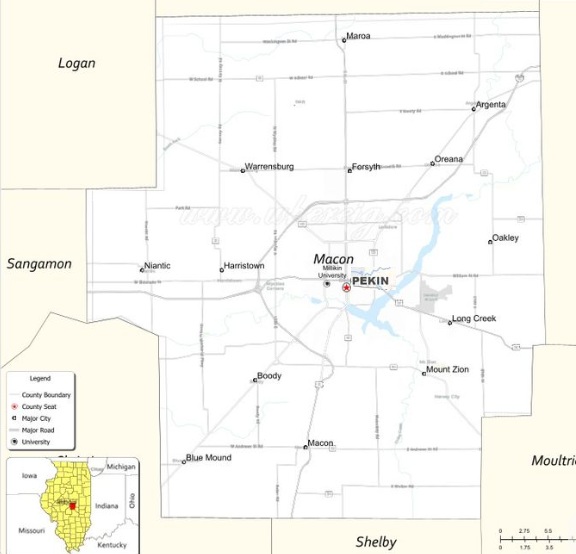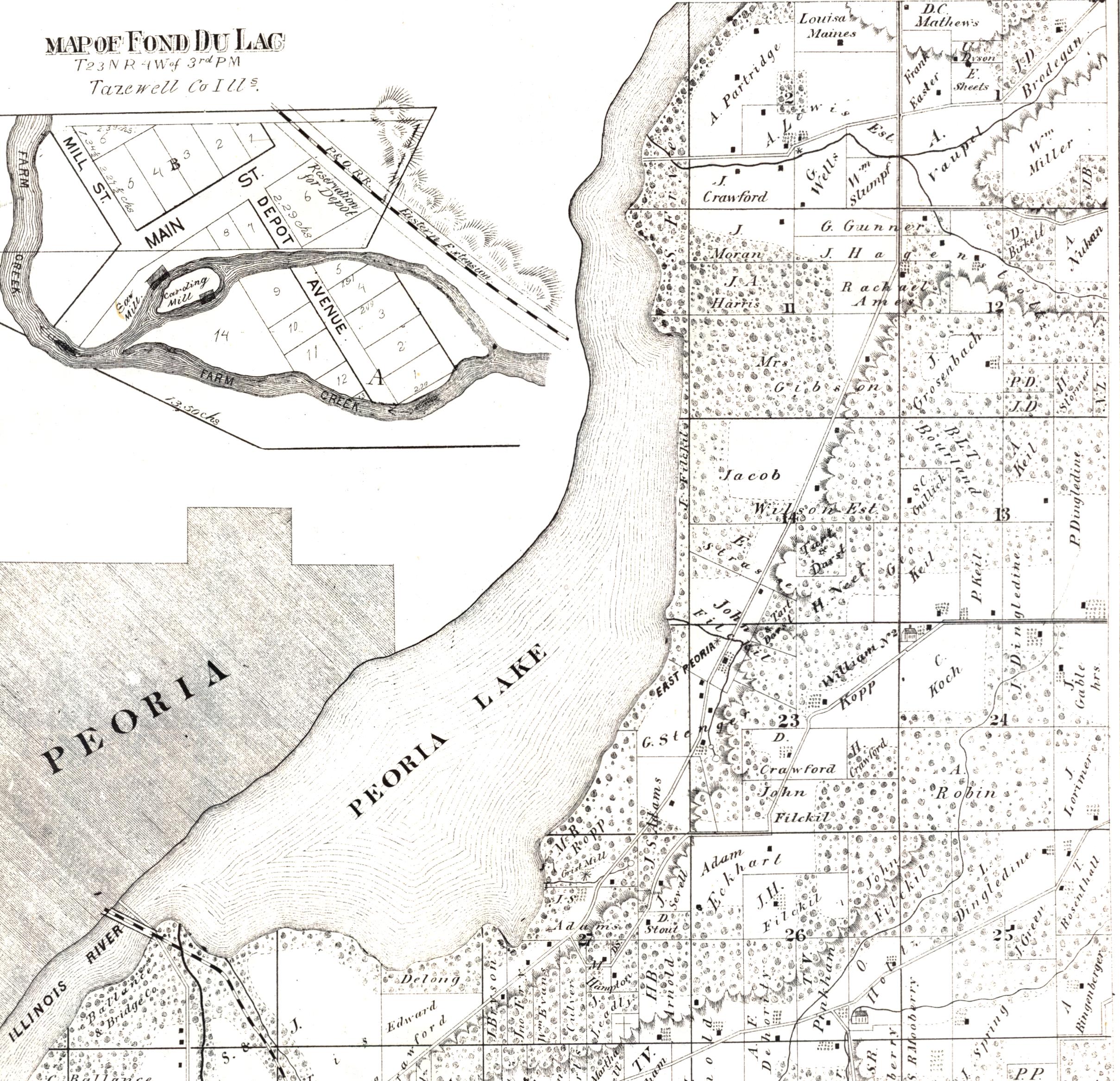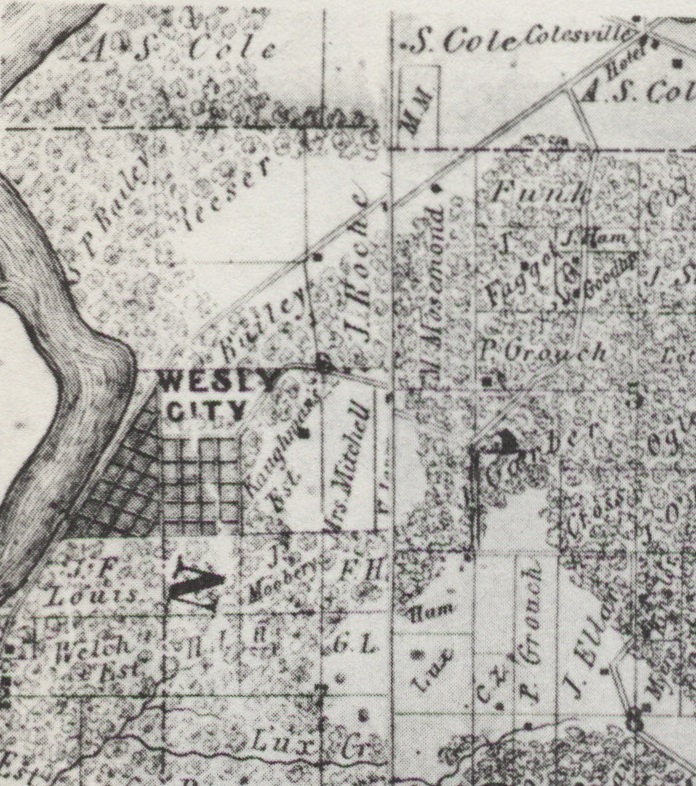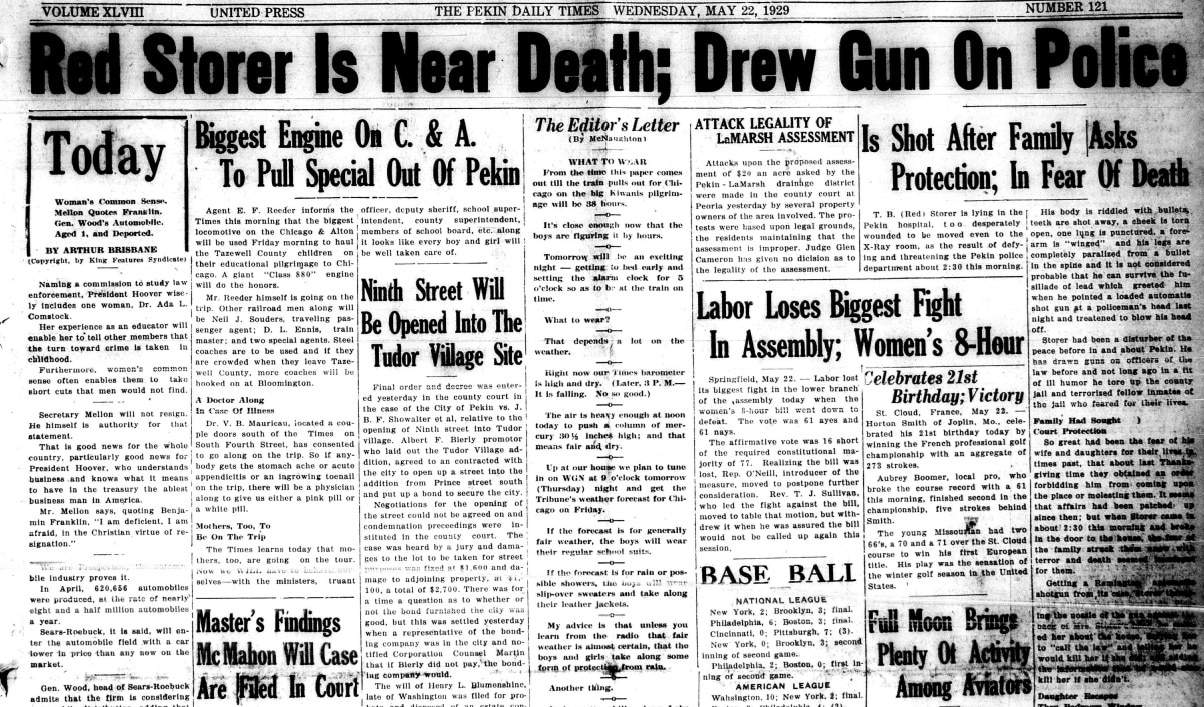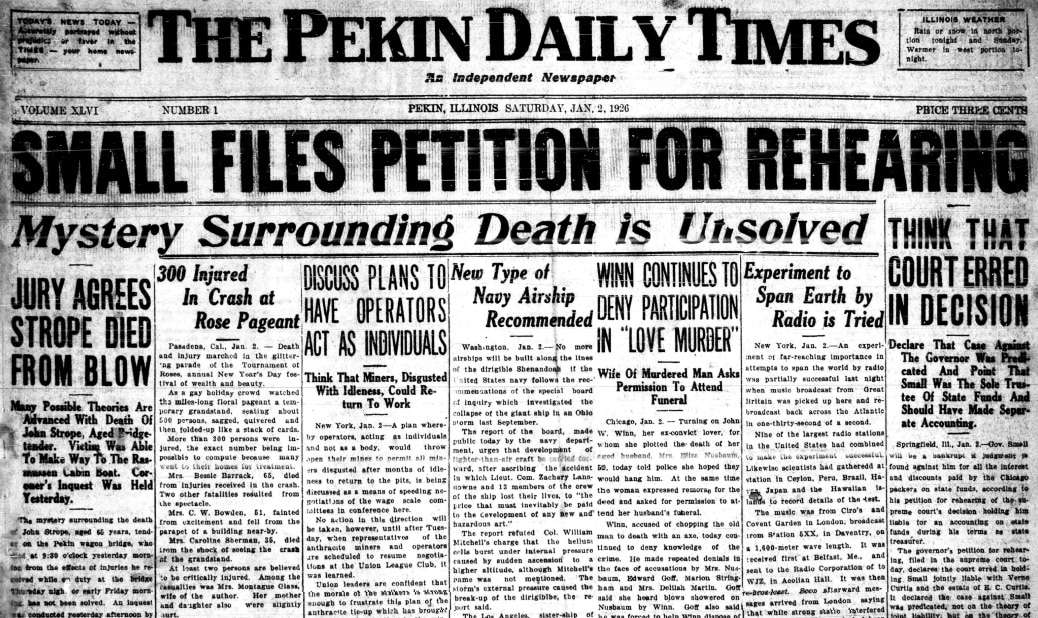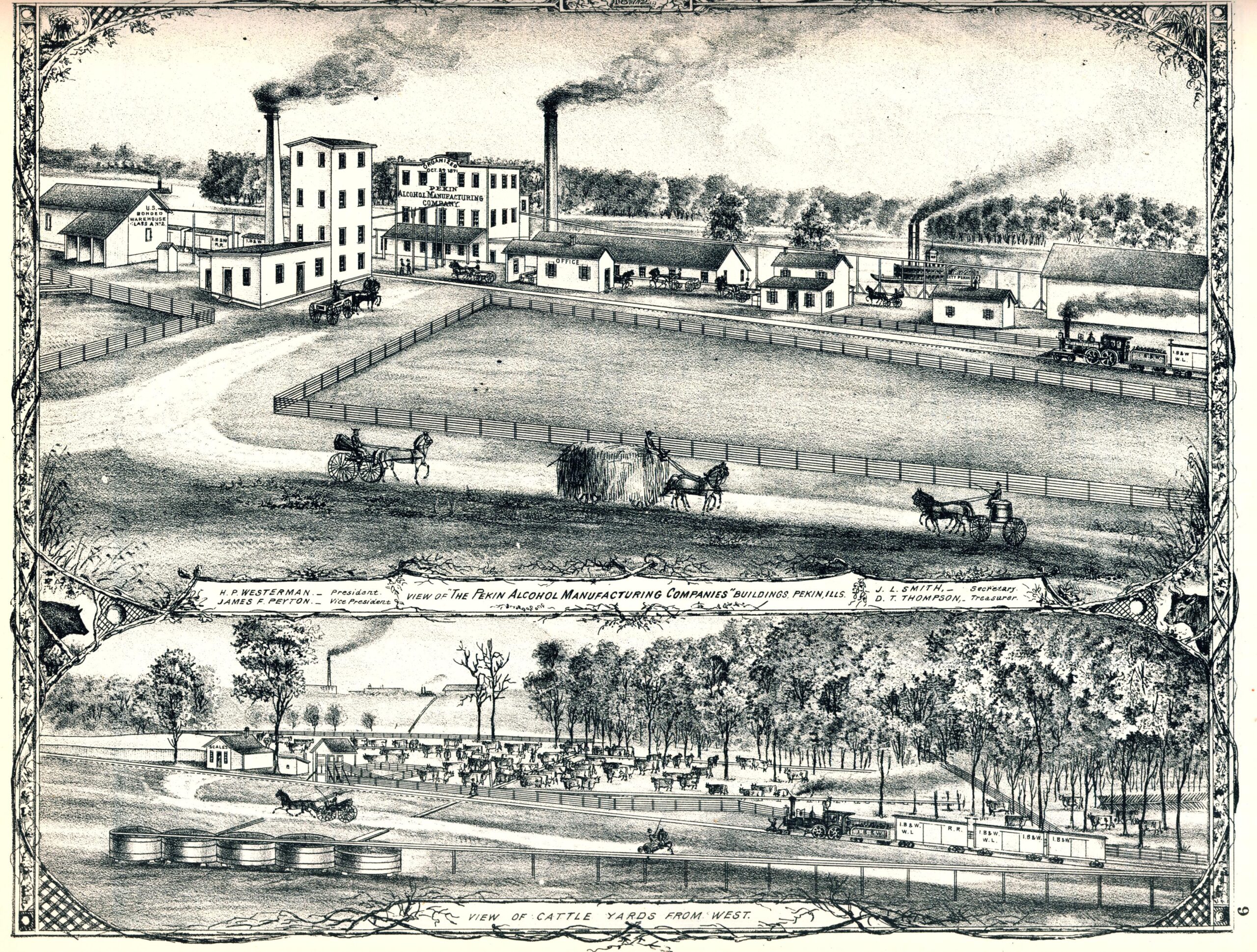This week we continue the March 14, 1896 Pekin Daily Times account of the legal hanging of Albert Wallace, who had murdered his younger sister Belle Wallace Bowlby in 1895. The Daily Times report of that day’s execution has been reprinted in the November and December 2016 issues of The Monthly, newsletter of the Tazewell County Genealogical & Historical Society.
The Daily Times report told of Wallace’s final night on earth in two sections, the first headlined “WALLACE’S LAST NIGHT,” with the subheadline “It Was Thought He Had Taken Poison – Did Not Want to Sleep,” and the second headlined, “LEARNED HIS FATE,” with the subheadline, “Said He Preferred Death But Would Like to Have Fooled His Enemies.” For the purposes of chronology, the order of those two sections has been reversed below:
*****

The news that the governor had declined to interfere was broken to Wallace as he sat in his cell about 6 o’clock last evening.
Father Kelly had gone to the jail to see if the condemned man wished his services. Sheriff Stout asked him if he wished to see the reverend gentleman and Wallace replied, “He can do me no good.” He then asked, “Have you heard anything from Springfield?”
“Yes,” said the sheriff.
“Well, what is the news?” asked Wallace.
The sheriff replied that the governor had declined to interfere and that he thought best to tell him.
Wallace replied that he “would rather know it than be kept in suspense.”
He asked that his sisters be sent to him as soon as they arrived.
Mrs. Quinn came up at 6:52 p. m. on the C. P. & St. L. She had been present at the hearing and she bore up with great fortitude. She had previously been informed by her brother’s attorneys that she should prepare for the worst, and had there been any good news, it would have been more of a surprise than was the governor’s decision. Mrs. Planck, the other sister, met Mrs. Quinn and together they went to the jail. There was a sad meeting as it was the last time the three were to be together. When the sisters expressed regret that the governor had not interfered, Wallace said:
“I would rather die than live in the penitentiary. The only thing was I wished to beat those people who wanted to see me hang. You have done all you could for me, so don’t worry and fret. I will be better off but it is hard for me to bear.” He was much affected by the consultation with the sisters and sobbed repeatedly.
At the end of fifteen minutes his sisters parted from him. The parting had been too much for Mrs. Quinn, weakened as she was by the work and worry of many weeks, and it was necessary to carry her down the stairs. Reaching the bottom she fainted and it was with difficulty that she was revived.
She left for Tremont on the evening train, taking the manuscript that Wallace had written during the last days of his life. What this is may never be made public, though it seemed to be the writer’s wish that some portions of it be given out.
*****

Wallace did not want to sleep last night.
He became very nervous early in the evening, and drank often, evidence of a feverish thirst.
He was given the freedom of the upper part of the jail, a privilege he seemed to want. There were three guards over him. These were Messrs. Chapman, Hatch, and Poebel.
He had slipped away from them once and gone down to the south end of the aisle between the top cells. When Death Watch Chapman started down to overtake him, he found Wallace at the bath tub, with a tin cup in his hand acting mysteriously. He hastily set the cup down, and Chapman emptied the contents out. Wallace appeared confused, and for several minutes sat on the tub, looking sullen and saying nothing.
He was taken ill soon afterward, and his pain was so intense that Dr. Harry V. Bailey was sent for. He administered an opiate hypodermically.
“If I had known you were going to do that, I would have stopped you,” said Wallace.
“It is good for you,” replied the doctor.
“If that is good for me,” retorted Wallace, “I don’t know myself.”
The pain continued, but he grew drowsy. This he attempted to fight off, saying that he wanted to keep awake. He succeeded, and his symptoms growing more uncomfortable, Dr. Bailey was again sent for, but Wallace refused to take any medicine. Much alarm resulted. It was feared that he had taken poison and was attempted to fulfill his boastful promises that he would not be hung, no matter what the courts or governor did. His illness was watched with much solicitude. At 1 o’clock this morning he asked for the TIMES, but it has not thought best to permit him to read. He was very weak, and had to be supported by the guards when he walked.
After an unusually bad spell, the stomach was relieved of its burden. Though weak and pale, he expressed himself as feeling better and by 2:30 o’clock he was asleep. Before he went to sleep Rev. Stewart offered up a long prayer, Wallace kneeling on the floor of his cell.
Rev. Stewart was constantly with him until 3:30 but the confusion that resulted from Wallace’s sickness, prevented any conversation on religious matters.
The guards were thrown out early in the evening and patrolled the square all through the long hours of the night, issuing their hoarse challenges to any who crossed the picket line.
Inside the jail, Winchester rifles were stacked in the corners and belts of cartridges were on tables ready for immediate use in the event of any trouble. It was not believed that any attempt would be made to tear down the enclosure but the sheriff did not wish to take any chance.
Wallace was astir at 5 o’clock. It was thought that he might weaken as gray dawn came. The light, however, which crept in through the east windows did not in the least affect him. He did not even become nervous as he awoke to a realization that the fatal day had dawned.
He was mindful of little matters and when his favorite guard dozed at one time he reached over and tapped him on the shoulder, that he might not be caught napping.
In conversation with one of the watch he said, “There are some in this town who think I am afraid to die, but when their time comes they will die harder than I. If they think I am afraid they are badly mistaken.”
It was expected that Wallace would order an elaborate breakfast this morning, the last meal before he crosses the dark river, but he surprised the cook at the jail by making the request for a simple meal of eggs, meat and potatoes, and a cup of coffee, identically the same breakfast allowed the other prisoners. In addition, however, the cook tucked in a big wedge of chocolate cake, as Wallace had a weakness for it. He ate the meal in silence but with an apparent good appetite.
In speaking about religion, one of the last things Wallace said was, “I have read my Bible, and I wish I could believe in a hereafter. There is one passage which urges us to forgive and forget, but I would rather go on the scaffold, die and go to hell, than forgive some of the people who testified against me at my trial.”
*****
Next week: Pekin’s last public hanging


